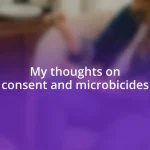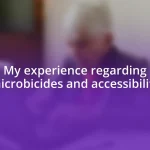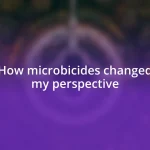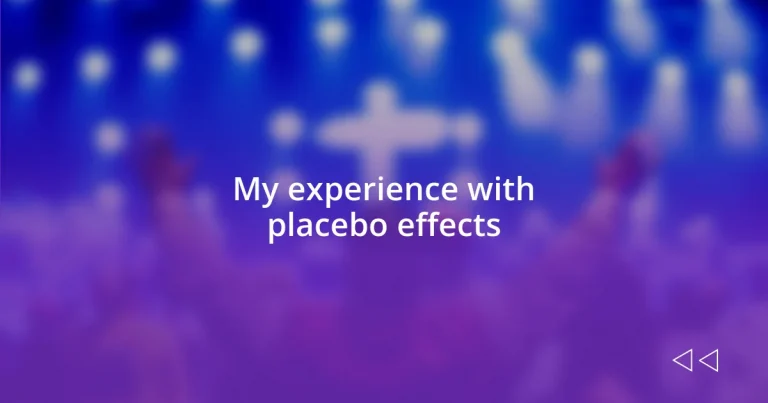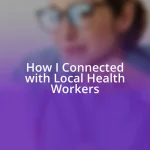Key takeaways:
- Placebo effects illustrate the powerful link between mind and body, demonstrating how beliefs can lead to real physical and emotional changes.
- Factors such as expectations, conditioning, and social influences significantly impact individuals’ experiences with treatments, affecting their healing processes.
- The practical application of placebo effects in pain management and everyday health practices highlights the importance of mindset and positive affirmation in enhancing well-being.
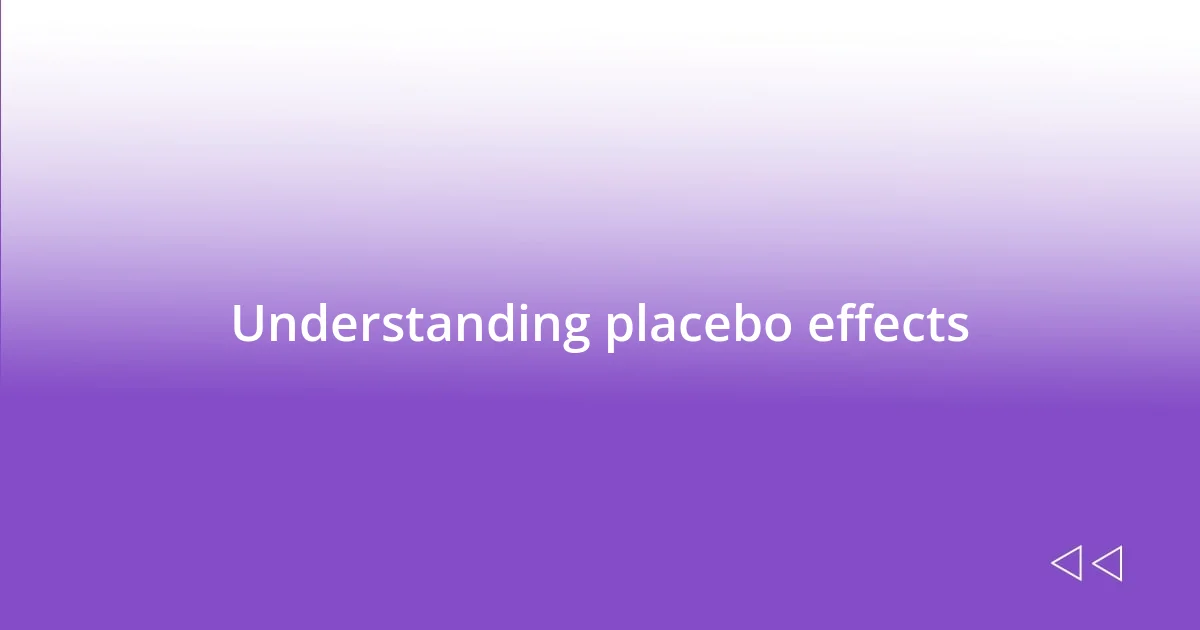
Understanding placebo effects
Placebo effects are fascinating because they highlight the intricate connection between our mind and body. I remember a time when I was participating in a clinical trial for a new medication, and while I didn’t know if I was on the actual drug or a placebo, I started to feel improvements. How can our beliefs and expectations shape our physical health in such profound ways?
One striking aspect of placebo effects is how they can sometimes rival real treatments. I once took a sugar pill for a recurring headache, convincing myself it would help. Surprisingly, the pain subsided, leaving me in awe of how simply believing in the pill’s power had an actual impact on my experience. Isn’t it incredible to think that our minds can create such tangible changes in our well-being?
Moreover, the placebo effect is not just limited to physical ailments; it can influence emotional states too. I’ve discovered that when I approach a situation with a positive mindset, even mundane tasks feel more manageable, and stress seems to diminish. Could our thoughts really hold the key to enhancing our quality of life? It’s a thought-provoking concept that continues to intrigue me as I explore the potential of our minds.
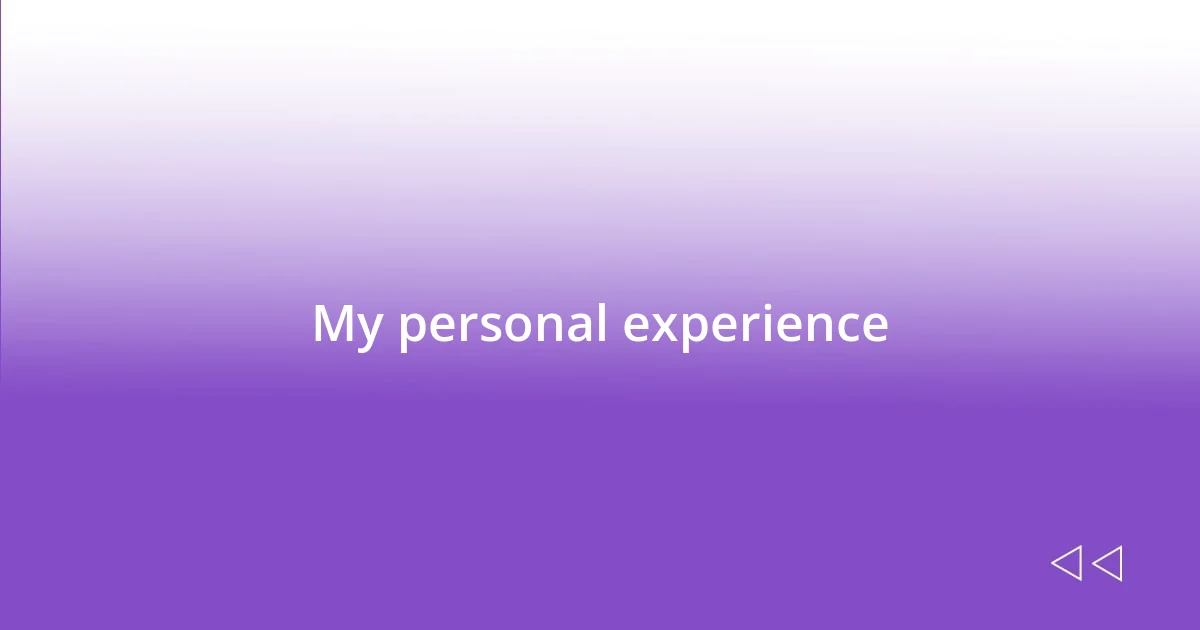
My personal experience
During my college years, I had my first real encounter with the placebo effect during a wellness workshop. Participants were given what we believed were herbal supplements for anxiety. I felt overwhelmingly convinced that these supplements would calm my nerves, and inexplicably, my anxiety levels dropped significantly during stressful exams. I wondered: was it the supplement or my belief that it would work?
Another memorable instance was when I had a nagging cold. I decided to test the placebo effect again by sipping on hot water mixed with lemon and honey, thinking it was a miracle cure. To my surprise, I felt better shortly after, almost as if my expectation of recovery sparked a change in my body. It dawned on me how much our perceptions can actually guide our healing processes.
I’ve also noticed the placebo effect in social situations. When I approach gatherings with a confident mentality, even if I’m feeling shy, I find that I enjoy the interactions more and feel lighter—almost as if my mindset itself sets the tone for the evening. This experience has led me to believe that our thoughts and beliefs can truly alter our emotional landscape in ways I had never considered before.
| Experience | Impact |
|---|---|
| Wellness Workshop | Reduced anxiety during exams |
| Hot Water Remedy | Felt better from cold |
| Social Gatherings | Enhanced enjoyment and confidence |
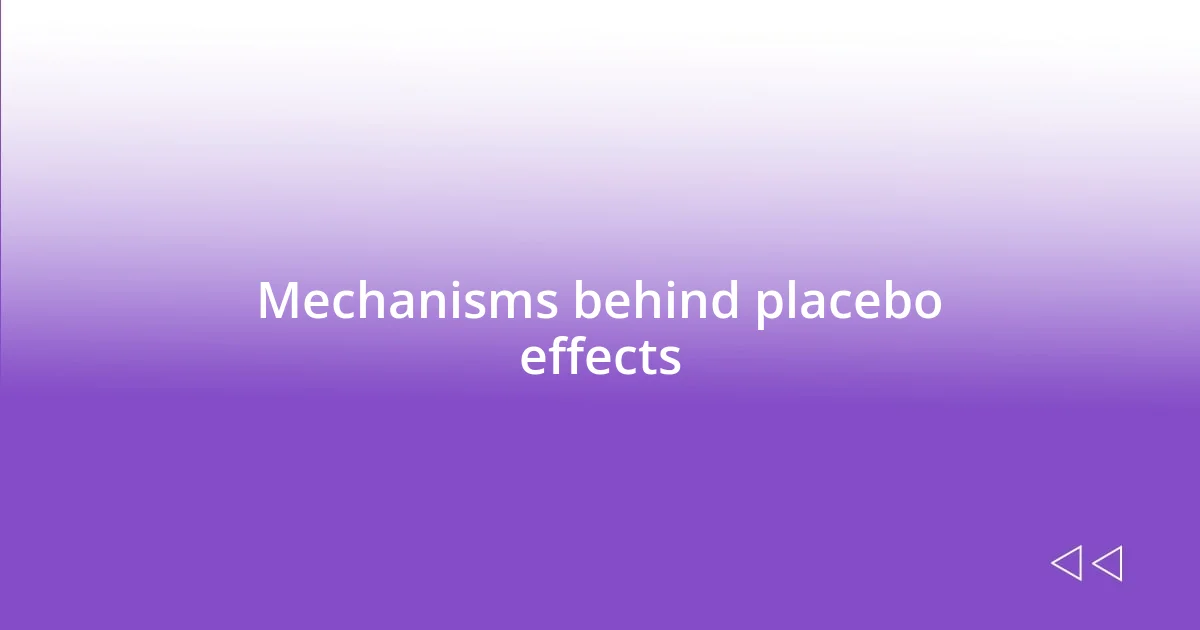
Mechanisms behind placebo effects
The mechanisms behind placebo effects are both fascinating and complex. One key factor is the brain’s ability to release neurotransmitters, such as endorphins, when a person believes they are receiving treatment. I remember attending a seminar on this topic, where the speaker described how the mind can trigger natural chemicals in the body that promote healing. It’s like flipping a switch; the expectation alone can set off a cascade of physiological responses.
- Expectations and beliefs: These play a crucial role, as our mindset can significantly influence how we experience pain or discomfort.
- Conditioning: Past experiences can condition us to respond to certain cues, such as a pill or a doctor’s white coat.
- Brain activity: Neuroscience studies show that placebo treatments activate brain regions involved in pain perception and emotional regulation.
I’ve noticed in my own life how much the context matters; one time I received a treatment that I believed was new and groundbreaking. Just the label alone made me feel more hopeful, and it was incredible how much better I felt just being part of that narrative. It’s a reminder of the immense power our expectations hold over our well-being.
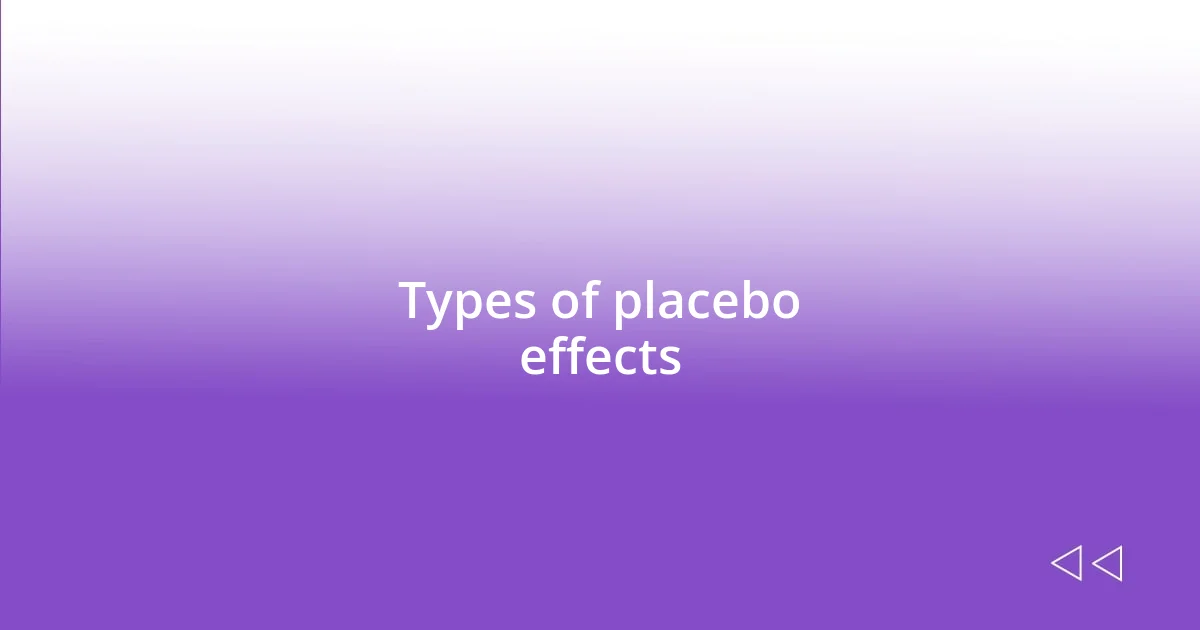
Types of placebo effects
Understanding the types of placebo effects can really illuminate how our minds operate in tandem with our bodies. One type I’ve often encountered is the “psychological placebo,” where the mere belief in a treatment—like being handed a sugar pill labeled as a miracle cure—can create real changes in how I feel. I remember feeling a slight headache fade away simply because I anticipated receiving something meant to alleviate it. Isn’t it fascinating how a simple shift in perception can have tangible effects on our pain threshold?
Another interesting type is the “contextual placebo.” This effect relies heavily on the environment and cues that surround treatment. For instance, when I got a massage in a serene spa, the ambiance—the soothing music, the aromatic oils—led me to relax more deeply than I might have in my living room. The setting itself communicated that I was in a space dedicated to healing, which, in turn, helped me ease physical tension I didn’t even realize I was holding. How often do we overlook the significance of our surroundings in enhancing our well-being?
Then there’s the “social placebo,” where the influence of others can amplify our own experiences. I’ve found that in group settings, when friends or family express belief in the effectiveness of something, I almost unconsciously start to feel better, whether that’s a home remedy or a new health trend they rave about. It raises the question: do we inherently borrow others’ beliefs to shape our own experiences? I suspect the answer might often be yes, and it certainly has shaped my own mindfulness practices and responses to stress.
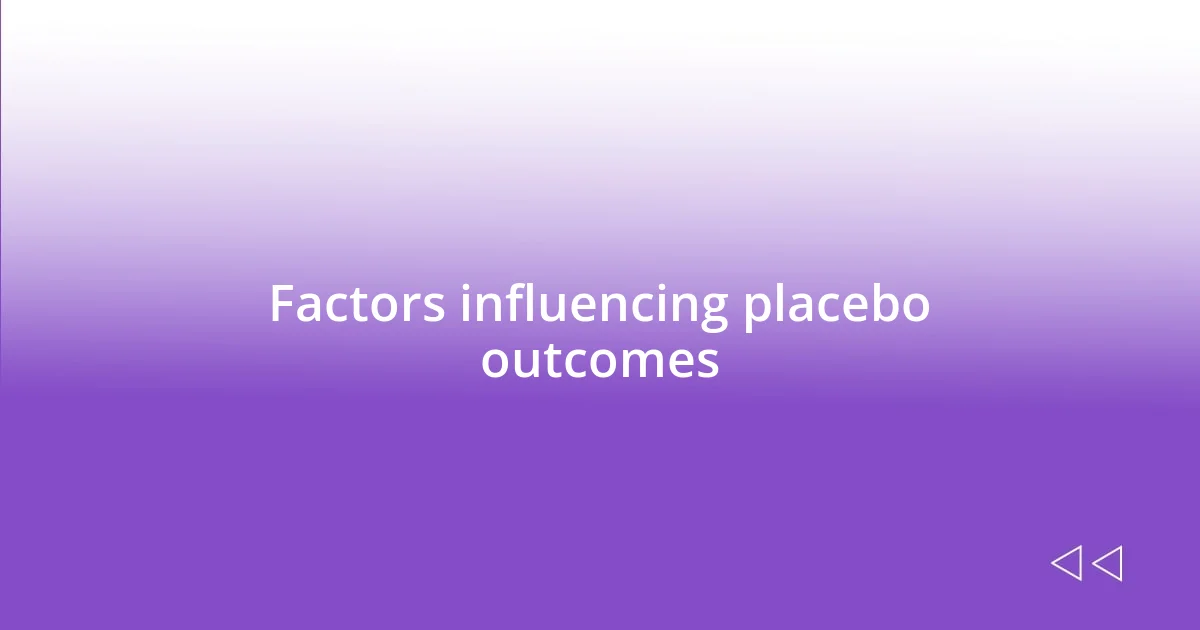
Factors influencing placebo outcomes
Expectations and beliefs can truly shape our experiences. I recall an incident where I was participating in a clinical trial for a headache medication. The moment I learned I was in the “active” group, my expectation of relief shot up. Curiously, even on days when the pain seemed resistant, the mere thought that I was doing something impactful made it feel more manageable. Isn’t it remarkable how our minds can set the stage for our physical responses?
Conditioning is another fascinating factor. I remember a time when I visited a particular clinic filled with familiar calming scents and the comforting hum of soft music. My body seemed to remember that environment as a healing space, which resulted in me relaxing the moment I walked through the door. It’s almost as if my past experiences had conditioned me to respond to that setting with a sense of peace. Have you ever felt that way in a specific environment, where your body instinctively understands it’s time to unwind?
Finally, I find the influence of social interactions incredibly compelling. Have you ever been in a situation where someone’s enthusiasm about a remedy made you feel better, even if you were initially skeptical? I was once convinced to try a “miracle” herbal tea by a friend who was certain it would change my life. The sheer excitement in her voice convinced me to give it a shot, and to my surprise, I felt a wave of comfort wash over me. This experience led me to wonder just how much our social environments mold our beliefs and—ultimately—our experiences with treatments.
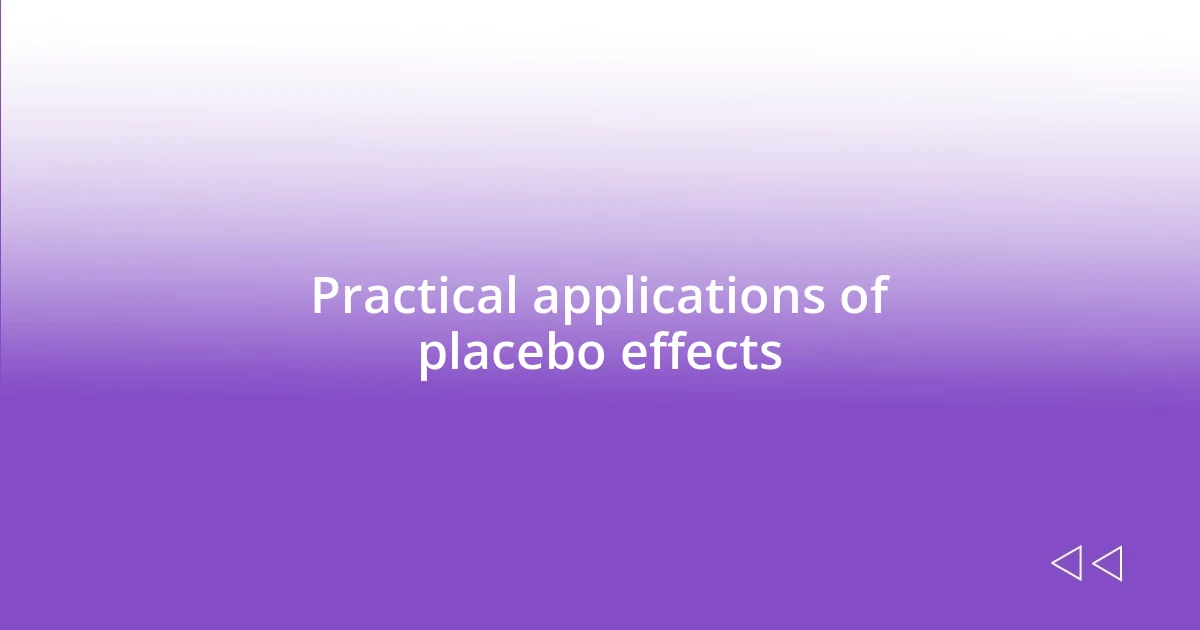
Practical applications of placebo effects
When it comes to practical applications of placebo effects, I can’t help but think about how they can be utilized in pain management. I remember one particular visit to a doctor’s office, where the physician took the time to explain how a new treatment might work. Just listening to his confidence instilled a sense of hope in me. I left feeling not only reassured but also more at ease with my discomfort, demonstrating how belief in treatment can alleviate pain.
In my experience with holistic therapies, I’ve found that the power of suggestion plays a crucial role. During a meditation retreat, the instructor spoke passionately about the benefits of visualization. As I followed his guidance, I began to truly believe I could manifest a deeper sense of calm. The outcome? I found myself drifting into a more profound state of relaxation than I ever thought possible. Don’t you think it’s remarkable how our minds can translate words into tangible experiences?
Moreover, employing the placebo effect in everyday health practices can be an incredible tool. For instance, I’ve started using affirmations when I feel anxious about an impending work presentation. Repeating phrases like “I am confident; I am prepared” has dramatically shifted my mindset. Each time, it feels like I’m not just saying words, but actually programming my brain to respond positively. Isn’t it incredible how a simple phrase can transform anxiety into empowerment?
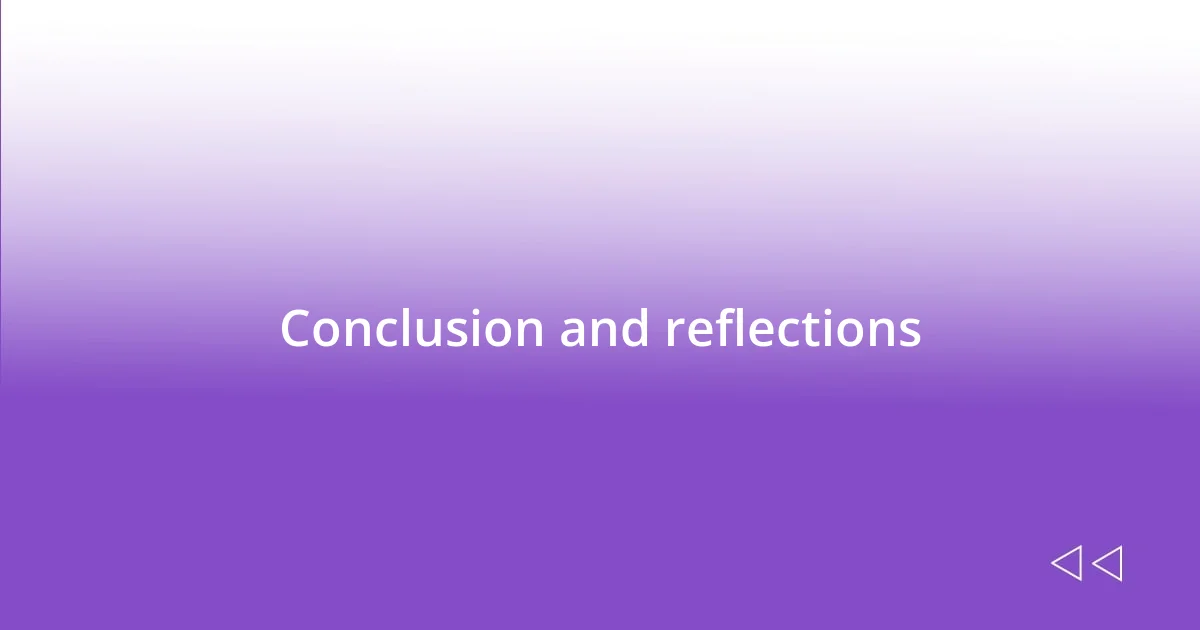
Conclusion and reflections
Reflecting on my journey with placebo effects, I’ve often come to realize just how intertwined our mental states and physical sensations are. There was a moment where I questioned whether it was just my imagination or if I truly felt better because I wished to feel better. This realization opened my eyes to the idea that our minds can wield incredible power over our bodies in ways we’re only beginning to understand. Have you ever experienced that shift where belief seemed to create reality?
Considering these experiences, I’m reminded of how awareness plays a crucial role in harnessing the placebo effect. I recall a time I felt a cold coming on; rather than resigning to it, I focused on positive thoughts and visualized my body fighting off the illness. It’s astonishing how simply prioritizing a positive mindset not only helped me feel mentally uplifted but also sped up my recovery process. Isn’t it interesting how a small internal shift can lead to such significant changes externally?
Ultimately, embracing the complexity of placebo responses has taught me to approach health and wellness with a sense of curiosity. I’ve started to appreciate not just the efficacy of treatments but the connection between mental and physical health. Engaging with this interplay can often lead to profound self-discoveries. Imagine how deeply nuanced our experiences could become if we gave ourselves permission to explore this connection further!
